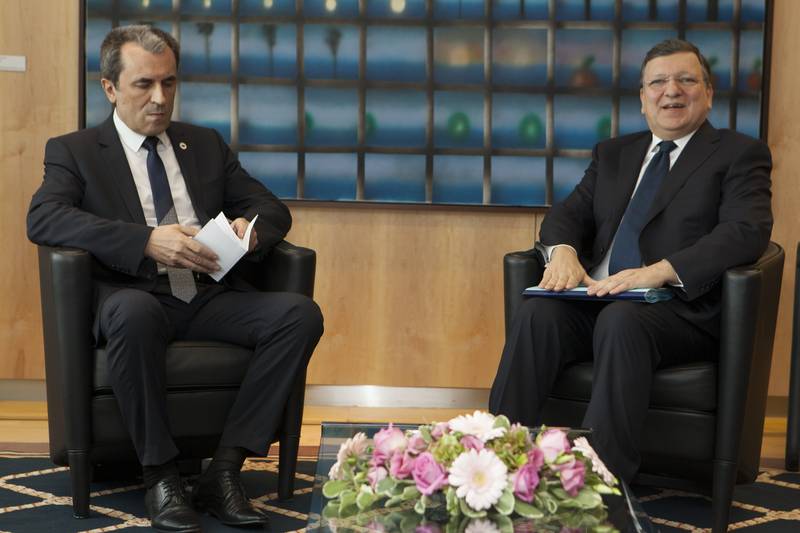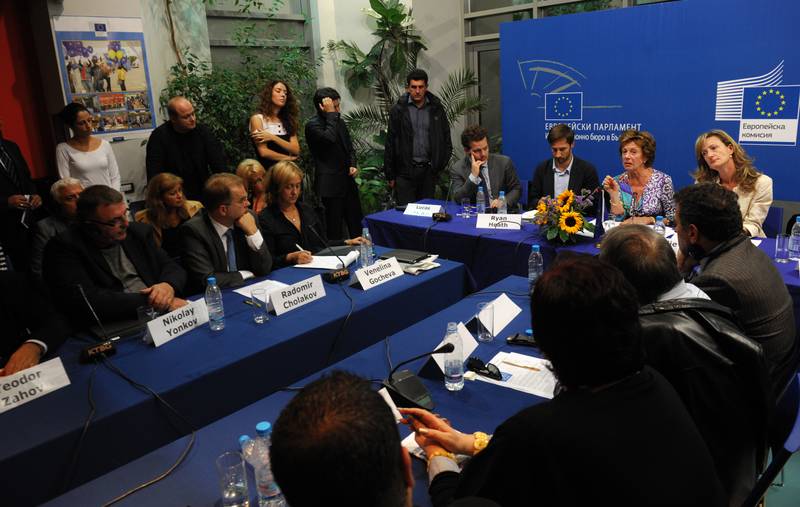They Don't Understand Us
Adelina Marini, January 1, 2015
 Why are the Bulgarians unhappy? This question has been drawing the attention of international analysts quite often recently but, alas, their analyses rather reveal lack of understanding. The people in the developed world find it hard to understand us because they got acquainted with us after the fall of the Iron Curtain in a period of romanticism from the unification. This romanticism, however, hid many of the important for a successful unification reasons for the differences between a life in a dictatorship and a free world. Recently, the based in Vienna think-tank European Stability Initiative (ESI), oriented very much toward the Balkans, published a brief text titled "Transition and happiness – a Bulgarian paradox?". Starting with the question mark in the end of the title right until the end of the text it becomes clear that it is very difficult for western analysts to establish the reasons for the Bulgarian unhappiness in spite of their quoting of Bulgarian analysts from that same transition.
Why are the Bulgarians unhappy? This question has been drawing the attention of international analysts quite often recently but, alas, their analyses rather reveal lack of understanding. The people in the developed world find it hard to understand us because they got acquainted with us after the fall of the Iron Curtain in a period of romanticism from the unification. This romanticism, however, hid many of the important for a successful unification reasons for the differences between a life in a dictatorship and a free world. Recently, the based in Vienna think-tank European Stability Initiative (ESI), oriented very much toward the Balkans, published a brief text titled "Transition and happiness – a Bulgarian paradox?". Starting with the question mark in the end of the title right until the end of the text it becomes clear that it is very difficult for western analysts to establish the reasons for the Bulgarian unhappiness in spite of their quoting of Bulgarian analysts from that same transition.
According to ESI, the Bulgarians are now famous with their unhappiness and their pessimism has caught the international attention a few years ago. In 2009, a Gallup poll found out that the citizens in Bulgaria have lower expectations about their lives in the next five years than the Iraqis or the Afghans. The World Happiness Report in 2013 showed that out of 156 countries the Bulgarians rank 144 after the Iraqis, the Afghans, the Congolese and the Haitians. This, according to ESI, raises both philosophical and political questions like, for example, is there a connection between happiness and freedom or does transition lead to happiness. The think-tank quotes purely empirical data like, for instance, that the Bulgarians have much more freedom today than the citizens of the unhappiest countries.
Compared to the Western Balkan neighbours, the Bulgarian leaders did most things generally right in the past two decades, as by right it is meant that they kept their country in peace, they did reforms, attracted foreign direct investments and got the country into the EU. The wages rose, the poverty decreased, employment increased. On the basis of this data, ESI is asking itself where does the paradox come from and quotes the "Bulgarian pessimist" according to whom, Bulgaria continues to be the poorest EU member state whose gross domestic product per capita is not even half of the EU average. In 2013, almost half of the Bulgarians suffered "severe material deprivation" which is the highest rate in the EU. The think-tank also quotes opinion polls according to which the Bulgarians who say that their material situation in their household is improving are less than one in seven.
To this should be added also the trend of 2013 young people to sent themselves on fire publicly. ESI believes that the Bulgarian perception of Bulgaria as a hopelessly poor, corrupt and desperate country is not convincing because the GDP in actual purchasing power increased from 31% of the EU28 average in 2002 to 43% in 2008. This, however, is not a precise assessment because the real average level in the EU falls with every enlargement wave so it is more accurate to measure the average for the period which in 2002 was the EU15 average. Then, the EU member states were only 15 and were relatively equally rich. Besides, 2002 is a period of significant global economic upsurge. Swallowing of ten new members in 2004 from the former communist block has changed the economic picture dramatically.
According to ESI, the Bulgarian GDP per capita reached 45% of the EU average in 2013 which, too, is inaccurate because after the 2008 crisis the average GDP of the EU dropped significantly as many euro area countries were in recession and the Union was joined by Croatia - a country with a recession in its fifth year and falling purchasing power.
ESI gives other examples too, like employment which increased significantly in Bulgaria. In 2002, 56% of the population aged 20-64 years had a job and last year (2013) their share was 64% which is higher than Italy (60%) and is close to the situation in Poland (65%). What is omitted, however, is that for the past 25 years Bulgaria has lost in immigration more than two million people - active and often very well educated population - which is a huge brain drain. The think-tank disagrees also with the Bulgarians' perception of the size of corruption. According to 76% of the respondents in a EU-wide poll, corruption is wide-spread in their countries, so Bulgaria is within the EU average, the text claims.
 Only five member states are worse in terms of paying bribes - Lithuania, Romania, Poland, Slovakia and Hungary. It is striking to ESI that in spite of the massive protests in the past years that led to real change, people in Bulgaria continue to be unhappy and not to trust their capabilities to change. In the text are quoted the anti-shale gas protests in 2012, the protests against the amendments to the forestry act, the referendum against nuclear power plants, protests against construction in the Natura 2000 areas, etc. Naturally, also quoted is the biggest protest of all times from the summer of 2013 against the appointment of Delyan Peevski as head of the powerful State Agency for National Security and is concluded that the protests led to changes and resignations.
Only five member states are worse in terms of paying bribes - Lithuania, Romania, Poland, Slovakia and Hungary. It is striking to ESI that in spite of the massive protests in the past years that led to real change, people in Bulgaria continue to be unhappy and not to trust their capabilities to change. In the text are quoted the anti-shale gas protests in 2012, the protests against the amendments to the forestry act, the referendum against nuclear power plants, protests against construction in the Natura 2000 areas, etc. Naturally, also quoted is the biggest protest of all times from the summer of 2013 against the appointment of Delyan Peevski as head of the powerful State Agency for National Security and is concluded that the protests led to changes and resignations.
What is happiness?
The think-tank provides too few and too inconsistent data in support of the so called paradox. The comparisons with Afghans and Iraqis on a purely nominal value are irrelevant when it comes to something so abstract as happiness. I have no ambition to give the right answer to the question why are the Bulgarians unhappy, but I can provide some personal observations. The most important reason for the Bulgarians' frustration from their lives, for the pessimism, desperation and the feeling of a lack of perspectives is the lack of justice, the lack of rule of law - one of the leading EU values enshrined in Article 2 of the EU Treaty. In the past years, the level of domestic crime increased sharply. In 2013, the Ministry of the Interior for the first time admitted that the domestic crime in Bulgaria has a gigantic size.
"Domestic crime is a huge problem which now affects national security", said in September 2013 the then deputy prime minister and minister of the interior Tsvetlin Yovchev. Proportionally to that the mistrust of the Bulgarian citizens has been growing in the police and the judiciary as institutions that can restore justice. People have no security for their property and life and after the case with the Corporate Commercial Bank they no longer have certainty about their savings, pensions or wages. A sense of impunity rules over the country, especially in terms of the powerful of the day - there are no high officials punished for corruption nor well known bosses of the organised crime. None of the investigations of the tens of mafia killings in the past 25 years has been completed.
In the past years, there is a strong process of decay of the system of values and even a civilisation clash can be observed between the few guardians of some moral norms and those to whom these norms mean nothing. It is true that the standard of living has increased compared to before but it is very important what you are comparing with. To me, a more accurate comparison would be not with before but with what could have been, especially when viewing similar examples along the EU's eastern periphery like the Baltic states, Poland and even the newest member state Croatia. For the 25 years of transition, in Bulgaria have been built a ridiculously small quantity of new roads, moreover with poor quality and huge doubts of corruption. In Croatia, which went through a devastating war of independence from former Yugoslavia, in a shorter period have been built several times more roads and especially motorways of very high quality.
It is true that in Croatia, too, this was accompanied by doubts of corruption but Croatia is the first country in South-Eastern Europe where a former prime minister has been sent to prison for corruption. In jail are also former ministers and other high ranking officials from previous but also from the current government. Under investigation currently is also the mayor of Zagreb, the capital city. Nevertheless, the perception of the Croats is also of widespread corruption, although the quality of life is significantly higher than that of the Bulgarians and increased in the same period as in Bulgaria but a bit shorter and after the shock of a war. Poland is another example that shows that the problem is elsewhere. The claim that the Bulgarian leaders largely did everything right is quite misleading especially when it comes to avoiding a war, doing reforms and attracting investments.
Misleading because ever since the beginning of the transition in 1989 Bulgaria has never been in a direct danger of a war. Besides, the example of Croatia shows that war is not necessarily a reason for lack of development. There were substantial reforms, that is true, but in times of uncertainty many profound mistakes have been made. And when it comes to investments, in the past few years there is a significant outflow. Against the background of what the leaders did wrong (consciously or else) the argumentation of an overall successful transition is poor. The fact that the Bulgarian leaders got Bulgaria into the EU is also hard to portray as a huge success because the Union for the first time made a compromise to adopt two completely unprepared countries - Bulgaria and Romania. For the purpose has been invented the Cooperation and Verification Mechanism which has revealed that it cannot function in a sovereign state which has systemic problems.
What did the Bulgarian leaders do wrong?
 First and foremost, no lustration has been done. On the political stage has remained active and influential a party which succeeded the communist party from the time of the dictatorship without the slightest of condemnation of the crimes of communism and totalitarianism. No analysis was made of the secret services which, in the words of Simeon Djankov, former deputy prime minister and finance minister, have maintained their influence very strong in today's politics in Bulgaria (and not only). The privatisation was done hastily and in a non-transparent way, thus handing over huge assets in the hands of close to the power people which laid the foundations of the oligarchy that entirely controls the country today. In the past years there has also started a process of decay of the media as a major corrective and instrument for pressure for reforms and the formation of reformist moods among the citizens. Bulgaria has dropped significantly in the media freedom index in the past years. In 2012, the country ranked 80th. In 2013 it collapsed to 87 and in 2014 it fell to number 100.
First and foremost, no lustration has been done. On the political stage has remained active and influential a party which succeeded the communist party from the time of the dictatorship without the slightest of condemnation of the crimes of communism and totalitarianism. No analysis was made of the secret services which, in the words of Simeon Djankov, former deputy prime minister and finance minister, have maintained their influence very strong in today's politics in Bulgaria (and not only). The privatisation was done hastily and in a non-transparent way, thus handing over huge assets in the hands of close to the power people which laid the foundations of the oligarchy that entirely controls the country today. In the past years there has also started a process of decay of the media as a major corrective and instrument for pressure for reforms and the formation of reformist moods among the citizens. Bulgaria has dropped significantly in the media freedom index in the past years. In 2012, the country ranked 80th. In 2013 it collapsed to 87 and in 2014 it fell to number 100.
The Bulgarian leaders not only never tried to prevent this but they actively took advantage of it. Practically, Bulgaria today is divided into two parts - the real one and the parallel universe created by the media empire led, as a matter of fact, by Delyan Peevski of whom ESI claims the protesters succeeded to take down. True, he did not become a head of the national security agency, but, instead, he still is a very influential figure in the governance of the country. Regarding corruption and the claim that it is not so dramatically higher than in other countries, the Carnegie Endowment think-tank published last year a huge study of the impact of corruption on national security. It points out that acute corruption should not be understood as a failure or distortion of government but as a functioning system in which the ruling networks use selected levers of power to capture specific revenue streams. This often overshadows the activities related with running the state. Systemic corruption evokes indignation in the population and makes it a factor for social unrest, is the think-tank's thesis.
These are only part of the reasons why a majority of Bulgarians feel unhappy - they know that whatever they do they cannot overthrow the status quo which in the past years, instead of weakening, has dug itself deeper and solid. The situation is even more dramatic when when media are not on their side. A major role played Russia too, defined by the new president of the European Council, Donald Tusk, as a strategic problem for the EU quite recently. However, Russia has been a strategic problem for Bulgaria for quite some time. In 2014, the division between those who love Russia and those who hate it increased dramatically reflecting the conflict in Ukraine and the tensions between EU and Russia. And the propaganda war the Kremlin waged has conquered solid ground in Bulgaria.
Happiness is hard to measure and explain but when it comes to a whole nation empirical data are completely irrelevant and even misleading. They obstruct making an accurate diagnosis which is vital for the finding of the right treatment. The reasons for the Bulgarian unhappiness lie in the rotten foundation the Bulgarian transition was built upon. In order for this to be better understood, it is necessary to make a thorough analysis of the mentality created during the 45 years of communist dictatorship, Russia's  (USSR's) influence and the then West. Such analyses had started to emerge but are still just a few and insufficient.
(USSR's) influence and the then West. Such analyses had started to emerge but are still just a few and insufficient.
Without a good diagnosis no treatment can be started. For Bulgaria it should start from the media environment. Because, okay, if we are comparing with a past period, may be, indeed, there is a nominal improvement. But can you imagine where could Bulgaria have been if there was no oligarchy, organised crime, nepotism, political appointments, the lack of justice at the lowest domestic level, high level corruption, propaganda, political corporations and if always, no matter the societal position, justice was served?
 Entrance to the Berlaymont building | © EC - Audiovisual Service
Entrance to the Berlaymont building | © EC - Audiovisual Service | © European Union 2020, EC - Audiovisual Service
| © European Union 2020, EC - Audiovisual Service Commission President Ursula von der Leyen | © European Union 2019 - Source: EP
Commission President Ursula von der Leyen | © European Union 2019 - Source: EP